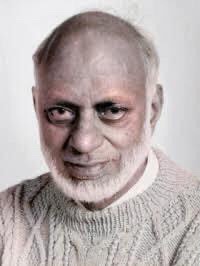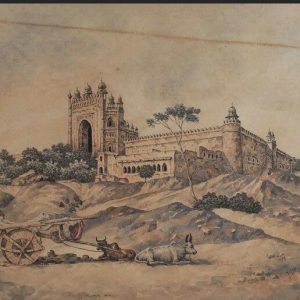
Saiyid Athar Abbās Rizvi was a prolific writer and scholar. He started his career, if I am not wrong, from Aligarh. When my father got an appointment at AMU and shifted to Aligarh in 1954, he stayed for a few months in the old rambling Nili Kothi of Dr Rizvi near Kela Nagar. So he must have been here from before 1954.
Rizvi was one of the favourite students (research scholar?) of Professor Mohammad Habib, and like him, started his academic career by writing on Sufism. Initially an agnostic, he would pass his time sitting in the Manuscript Section. Another person who would also be sometimes there was another Athar: M Athar Ali. At leisure time they would not only discuss the various manuscripts and the information there but also indulge in light banter! Once a scholar reading a manuscript detailing Babur’s conquest read a statement in Persian “ba afwāj i qāhira humlā namūd”! On reading it the scholar exclaimed “Oh! Babur came to India with the contingents from Cairo!” [afwāj i qāhira only meant “ferocious army”!] Till the very end of his life, the scholar was made a butt of this joke by Rizvi Sahib and he would narrate this incident to everyone with much aplomb! This was actually repeated me by a well known French scholar who came to meet me in Paris when he came to know my relations with Professor Rizvi! He would also those days make fun of my father for his religious ways! To Athar Abbās Rizvi of those days, religion was nothing but a dangerous opium!
About him, Mohammad Habib however once predicted in writing in one of Rizvi’s works on Sufis that “If he continued in this way, he would end up one day as a great mystic one day”! And what a keen understanding that was of a student of his!
Rizvi wrote extensively on mysticism. His two volumes on Indian Sufism is a testimony of that! He also wrote on Shāh Waliullah. Another of his books was on Shāh Abdul Aziz Dehlavi and a third on Muslim Revivalist Movement in India. He has six volumes on Freedom Struggle in UP. Another of his projects was the translation of Persian sources into Hindu. It is a counterbalance to the colonial translation project of Elliot & Dawson. He wrote much more: from Iranian Revolution to Fatehpur Sikri! His first book on Sikri is still being published by the ASI as an ideal tourist guide and remarkable insights. The second book on Fathpur Sikri, done along with his research student VJA Flynn, is the first source based project on that capital city of Akbar which is still unparalleled and classic. Similarly his two volumes on the history of Shias in India is a masterpiece in spite of many of its drawbacks.
When I started work on Fathpur Sikri, one of my first paper to be presented was in his presence in the audience. He was an old man and Irfan Habib had told me that if Athar Sahib does not tear it down and maul you for writing it (it was very critical to some of his views), then you carry on with the topic, else forget it. When I made the presentation, Athar Sahib shuffled up from his seat, resting himself on his stick, cleared his voice and said: “I wish a day comes when you are an old man, and a young man tears you down!” My face went pale, there was a pin drop silence. Then he chuckled and continued “But more seriously young man, your criticism is valid: I was writing of Fathpur Sikri, sitting in Canberra and with most of my references back home in Aligarh! You are correct in your analysis and I congratulate you for it!” My supervisor smiled, and decades later I completed my book Fathpur Sikri Revisited!
However to me his best work was Religious and Intellectual History of the Muslims in Akbar’s Reign 1556-1605 published in 1975. Unfortunately out print and out of mind, this is so far one of the best works to understand Abu’l Fazl, as well as the debates which took place in Akbar’s Ibādatkhāna. A very good account of what was Sulh i kul, is also given there. I don’t know why Aligarh, as well as other centres which teach Medieval India have neglected it? This book needs to be reprinted and made available to the students and teachers alike!
True to the predictions of Mohammad Habib, Athar Abbās Rizvi soon transformed from an agnostic into a godfearing mystic. He grew a beard, established a library and an Imāmbada in his Aligarh house, where he would return each Muharram during the last decades of his life. I very well remember Athar Sahib coming to my house for the majlis with a bundle of books wrapped in a red cloth. And till the start of majlis he would sit on a sofa with that bundle of papers, busy in making corrections. I once asked what was it? He said proofs of a book on the Indian Shias. He would also sometimes after the majlis go to where my father’s books were kept in our home library and sit there for hours.
He would fast every thursday, recite ‘āmāl i Āshūr every week. He ultimately died in Mashhad, Iran and is now buried within the precincts of the Shrine of Imām i Reza, from whom he traced his descent.
May his soul rest in Peace!
• Syed Ali Nadeem Rezavi
